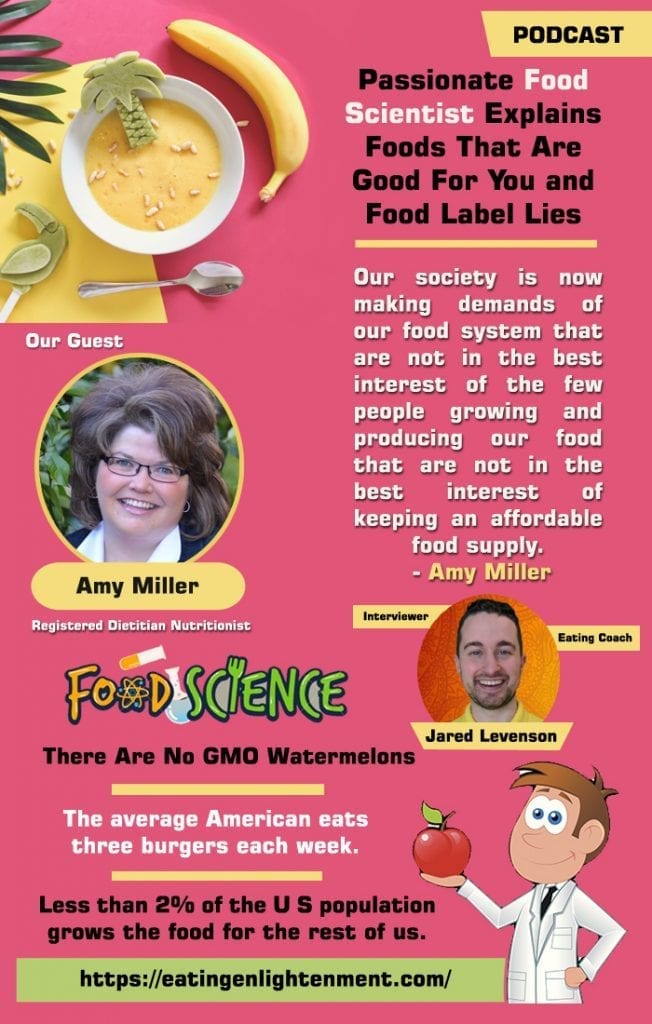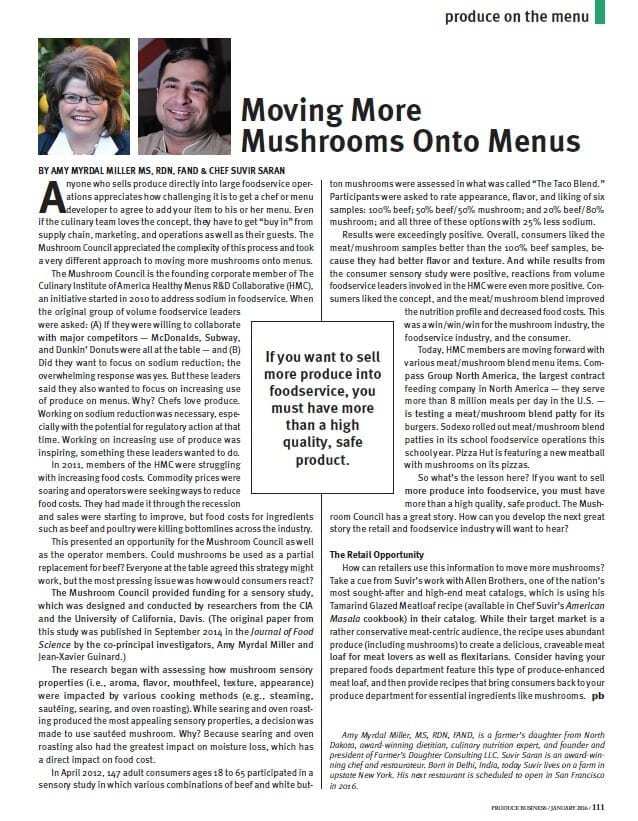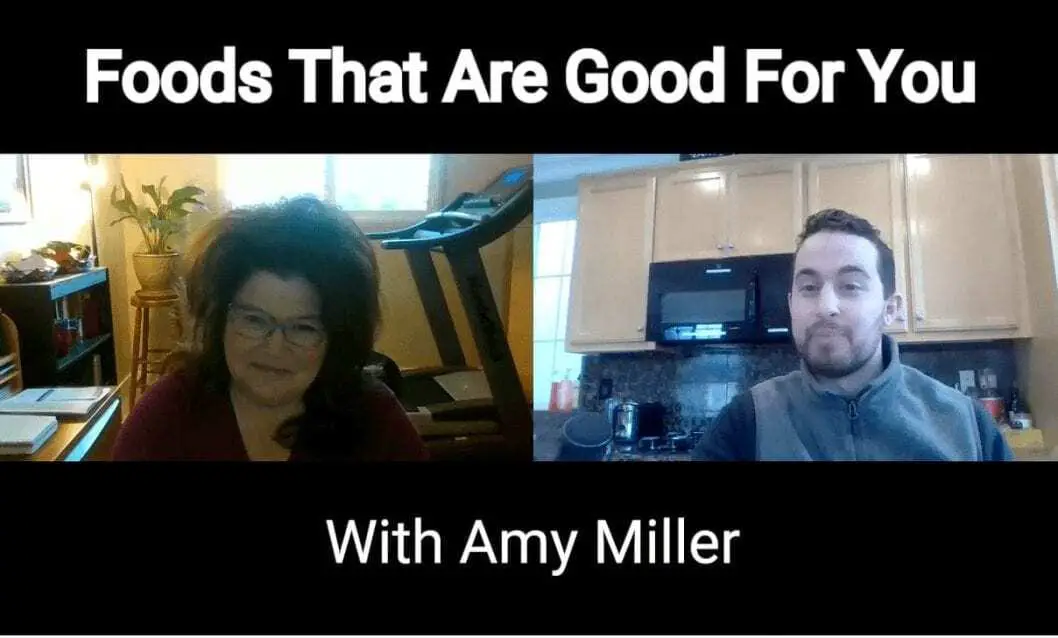
Amy spent 6 months worrying about her keynote speech for the Academy of Nutrition and Dietetics.
Finally her friend told her to just stop worrying and just tell the audience about her passion for food, farmers and fun. Her keynote speech was titled “Success in dietetics, inspired by farmers, flavor and fun.”
In this article video interview about foods that are good for you, you will learn:
- Real Life Example Of Food Label Lie
- What Scientific Article You Published Makes You Most Proud?
- What Percent Of A Burger Can Actually Be Mushroom?
- What Was The Topic Of Your Keynote Speech for the Academy of Nutrition and Dietetics?
- What Mission Inspired You To Start Farmer Daughter’s Consulting?
- The History OF Why GMO’s Became Fearful
- What Is One Of The Best Foods That Are Good For You?
- Do It Yourself Olive Oil Taste Test At Home
- What Are Your Top 5 Foods That Are Good For You?
About The “Foods That Are Good For You” Transcript and Interview
I have arranged this article about foods that are good for you to answer these questions using the dialogue from our interview. You can watch the full video below, or download the podcast mp3.
I have italicized and slightly edited Amy’s dialogue for readability and context.
Also, I don’t have enough room here to do Amy’s career proper justice! Amy has had an amazing career!
Amy’s Career Accomplishments Include:
- Amy was the 2014 recipient of the Tufts University Friedman School of Nutrition Science & Policy Nutrition Impact award, the 2013 recipient of the California Dietetic Association Excellence in Research award, a 2007 recipient of an ADDY award, and the 2003 recipient of the Produce for Better Health Foundation Diamond Crystal Award.
- Award-winning Registered Dietitian Nutritionist, farmer’s daughter, highly regarded public speaker, published author, and founder and president of Farmer’s Daughter® Consulting, Inc., a privately-held agriculture, food, and culinary communications firm.
For more info about Amy as well as her consulting services for farmers, and other foods that are good for you, please visit – https://www.farmersdaughterconsulting.com/
Real Life Example Of Food Label Lie
- There is no such thing as a GMO watermelon
- But one food companies claims their watermelons are “non-gmo”
- This is a misleading food label lie
Watch at 21:18
In our food system today people in marketing hold a lot of power, whether that’s in a restaurant chain or a consumer packaged goods company. And decisions are made that will get a consumer to spend his or her hard earned money on your product, your restaurant, your new packaged whatever.
That’s unfortunate because the more that marketing focuses light on something like non-GMO, the more people feel like that’s the best, you know? And you know, it drives me crazy.
There Are No GMO Watermelons
There are products that don’t have a genetically modified counterpart like watermelon. Yet there’s watermelon juice on the market that’s non-GMO. Well, who cares? There is no GMO watermelon. So, why are you saying that? And it’s because the more claims that are on a product, the better we as consumers feel about it.
PS – There are also sorts of claims about risk of heart disease, blood sugar, vitamins and minerals, health benefits, healthy fats, low in calories, blood pressure, free radicals, risk of type 2 diabetes, help protect blood pressure, etc …
You get the point. There’s a ton of medical advice out there. There’s simply too much!
My advice. Go natural. Eat things from nature. All these food labels can be deceptive!
What Scientific Article You Published Makes You Most Proud?
- Most proud article is how making mushroom burgers can taste better and be environmentally friendly
- Two papers out of UC Davis
- The average American eats 3 burgers per week
Watch at 1:21
I started my career back in the late nineties and I wasn’t comfortable with the research we were using on behalf of our clients who are part of the food industry. And my cynicism about the research led me to get a job in clinical research.
And so it was a privately held company in Massachusetts, owned by a cardiologist and part of our responsibility was designing the studies, getting funding, designing the studies, recruiting study participants, leading them through protocols, anywhere between 12 weeks to nine months and then getting published.
So that’s when my peer reviewed publications started on different dietary interventions that would reduce risks of heart disease, blood pressure, blood sugar, etc.
What am I most proud of?
That’s work that I did when I was with the culinary Institute of America and we partnered with the university of California Davis and their sensory science department to do research to see if consumers would accept ground beef that was blended with mushrooms.
And this research was done because we were working with a group of large volume food service operators, men and women who work for the biggest restaurant chains in this country. And they were getting intense pressure about food costs and we Americans love burgers.
Food Costs Drive Innovation
This is at a time when the price of beef, chicken, other, um, animal based protein sources were going through the roof for a number of reasons. And we asked, “What if this was a strategy for reducing food cost by cutting the beef with mushroom while also changing the nutrition profile and also having a little bit of a sustainability story to tell?”.
And I got two papers out of that research that I did with Dr. Johns at UC Davis and it’s changed how the industry is now thinking about blending animal protein with plant based sources.
What we found in the mushroom study is people liked the product better because it had better aromas. It was tastier, it had a different mouthfeel, so yeah. That’s awesome. They liked it more.
What Percent Of A Burger Can Actually Be Mushroom?
- People prefer 50% mushroom 50% meat blends most
- Younger generation females preferred 80% mushroom 20% meat
- Men thought they would not like the mushroom burgers but did
Watch at 5:54
So we had people in this study, the ages of 18 and 65 and they were screened to make sure that they would eat mushrooms, that they didn’t have an allergy or an intolerance.
We did have a number of people who were self-described meat and potatoes. They were mostly men who their preconception was, “I’m not gonna like this.”
And we tested a 50% wind and 80% mushroom, 20% beef. And people who said beforehand they liked meat and potatoes or had some resistance to mushroom burgers, these people liked the 50, 50 blend.
The younger millennials, especially younger millennial females preferred the 80 20 blend with lots of mushrooms. Just a little bit of beef.
(And nowadays you can also by vegan burgers too!)

What Was The Topic Of Your Keynote Speech for the Academy of Nutrition and Dietetics?
- Over 75,000 members
- Spent 6 months preparing speech
- Speech was titled “Success in dietetics, inspired by farmers, flavor and fun.”
Watch at 7:50
It’s the biggest honor I’ve received in my career. And you get nominated for this. It’s a competitive process. The Academy has over 75,000 members.
There’s a lot of us dieticians out there who are Academy members and when you get the honor, you’ll get notified, 15 months in advance of when you have to give the speech. You can talk about whatever you want.
It seems awesome, but it’s also quite torturous. I spent about six months, I travel a lot and I spent my time on airplanes, jotting down ideas. And finally one of my mentors said to me, “stop making yourself crazy. Talk about what you know best, your success in your career path.” So my speech was titled success in dietetics, inspired by farmers flavor and find.
How are you defining success in dietetics?
- Success is being happy
- Not ‘keeping up with the Joneses’
- Amy’s journey with type 1 diabetes
So it took me a long time to figure out what success means to me. Early in my career, I wasn’t making a lot of money. I was scrapping along, living in a horrible apartment outside of San Francisco when the first tech boom happened in the late nineties, early 2000’s, then it was down in LA.
Everybody was living this fast, hard life and it was keeping up with the Joneses. And so I was, I was thinking success was making another dollar or another 10,000 or 20,000.
And when I started my own business, Farmer’s Daughter Consulting, what I realized was that success is being happy.
What Are Some Misconceptions About Dietetics?
Most people say that when you finish your internship that your first job should be in clinical dietetics, that you should work in a hospital or clinic and that you need at least a year of that before you go out and practice anywhere else.
And I have type one diabetes. When I was doing my internship, I had to do staff for leave for six weeks in a kidney transplant ward of the hospital. It was really depressing because most of the people getting the kidney transplants were people with poorly managed diabetes, some getting their fourth or fifth kidney transplant.
I went home every night and cried myself to sleep during that time.
Finally I said, “I can’t do this. I can’t stand over someone’s hospital bed or sit across from them in a clinic telling them things that maybe would have been helpful 20-30 years ago.” I know there’s some people I could help right now, but it just didn’t seem like the right fit for me professionally or emotionally. So I went to grad school research about communications.
Side note – I’d like to add that there can be a huge misconception about coffee in the field of dietetics. Sometimes you hear that coffee is bad for you, but nothing could be further from the truth. Coffee has tons of antioxidants! The key is to try things out for yourself and not take an authority’s opinion on the subject.
For example, brew some great coffee for yourself, don’t take anyone else’s word on it, and see how it makes you feel.
What Mission Inspired You To Start Farmer Daughter’s Consulting?
- Less than 2% of the population grows food for the rest of us
- Consumers don’t know what’s best for them or what foods that are good for you
- Deliciousness and environmentally friendly go together
Watch at 14:34
Today what I am doing is being a voice of science, evidence, research and technology on the side of farmers.
And we as a society have been putting more, more pressure, the demands that we’ve been making, thinking that this is good for communities, good for sustainability, good for the farm economy.
What consumers are pushing for is not good for the environment.
So most of my work today in the communication side is educating about what’s going on in modern agriculture and why these choices are made.
And then what leads to deliciousness? Because talking about nutrition, people go, “Oh, that sounds like that probation.” But if you talk about flavor and deliciousness, and I can do this by promoting foods and ingredients that are inherently helpful, but how do you cook them, prepare them, present these foods that are good for you, in ways that people go, “I want to eat more of that.” That was so good.
The History OF Why GMO’s Became Fearful
- Consumers believe GMOs are bad
- Our brains are drawn towards fear
- Activists decades ago successfully linked GMOs to fear
Watch at 18:43
It’s been led by an activist movement that was very organized.
On the other hand and the companies producing the genetically modified seeds were thinking they needed to talk to their customer, the farmer, and they kind of missed out on a whole chapter of consumer conversations and the activist narrative caught on.
The activist narrative was told in such a way that created fear and doubt.
And we’re hardwired to pay much more attention to something that induces fear and doubt than something that creates a sense of ease. This is back in the days when you could be chased by a saber tooth tiger. Right? Morning.
There’s something coming to kill you and you’re like, that’s my focus. Everything I do has to be avoid that something that’s going to kill me. And we’re still hardwired that way.
The activists knew that and they did their job well.
But the unfortunate consequences that our society is now making demands of our food system that are not in the best interest of the few people growing and producing our food that are not in the best interest of keeping an affordable food supply.
There’s still a lot of Americans who are hungry and are food insecure and not in the best interest of protecting the environment.
What Is One Of The Best Foods That Are Good For You?
- Olive oil
I love teaching people about Olive Oil, buy it, cook with it. There’s BS out there about you can’t heat extra Virgin olive oil. Yes you can. You just don’t want it to be at super high heat for a long period of time. But if you enjoy broccoli, for example, it’s sauteed and extra Virgin olive oil with a little bit of garlic. My God, that’s one of those foods that are good for you and it’s how you should cook and eat your broccoli.
Authors note: Olive oil is truly amazing for you. It’s one of those superfoods that also is a healthy fat that pretty much does everything for you. Olive helps you protect against risk of heart disease, excellent source of vitamins and minerals, helps blood sugar and type 2 diabetes, and contains free radicals which may also help lower blood pressure.
Do It Yourself Olive Oil Taste Test At Home
- Swallow little bit of olive oil to see if it makes you cough
- 3 coughs very powerful
- 2 coughs ok
- 1 cough very little phenols
- Phenols are a protective compound for your brain
Watch at 27
People who do sensory evaluation of olive oil talk about a one cough, two cough or three cough whale.
And that means if you take just all of oil, put it in your mouth, bring in air, swirl it around your palette and then swallow it.
If you don’t cough at all, there’s very low levels of the beneficial phenols. If you cough once there’s some phenols, if you’re coughing three times, that is a powerhouse phenol with so many protective compounds that are beneficial for our brains, for our hearts.
What Are Your Top 5 Foods That Are Good For You?
- Coffee
- Full fat greek yogurt
- Walnuts
- Whole grain toast
- Olive oil with veggies
Watch at 33:08
Most consistently, every single day I have coffee. That’s a given no matter where I am in the world.
I love full fat Greek yogurt with no flavorings, no sweeteners. This is one of those foods that are good for you.
And I eat lots of walnuts. I stir them into full fat Greek yogurt.
Lunch today was a homemade Italian meatball soup with lots of beans in it and vegetables and whatnot.
At least once a week is chopped frozen spinach, fresh star, like this minced sauteed in olive oil with red pepper flakes. And then I add in eggs and a little bit of cheese. Sometimes it’s sharp white cheddar, sometimes it’s Parmesan. And I have that with whole grain toast. Like I love that meal.
For another powerful article and interview about food, foods that are good for you, etc click here to watch “How To Not Binge Eat Case Study: Intuitive Eating After 140 Pound Weight Loss“





